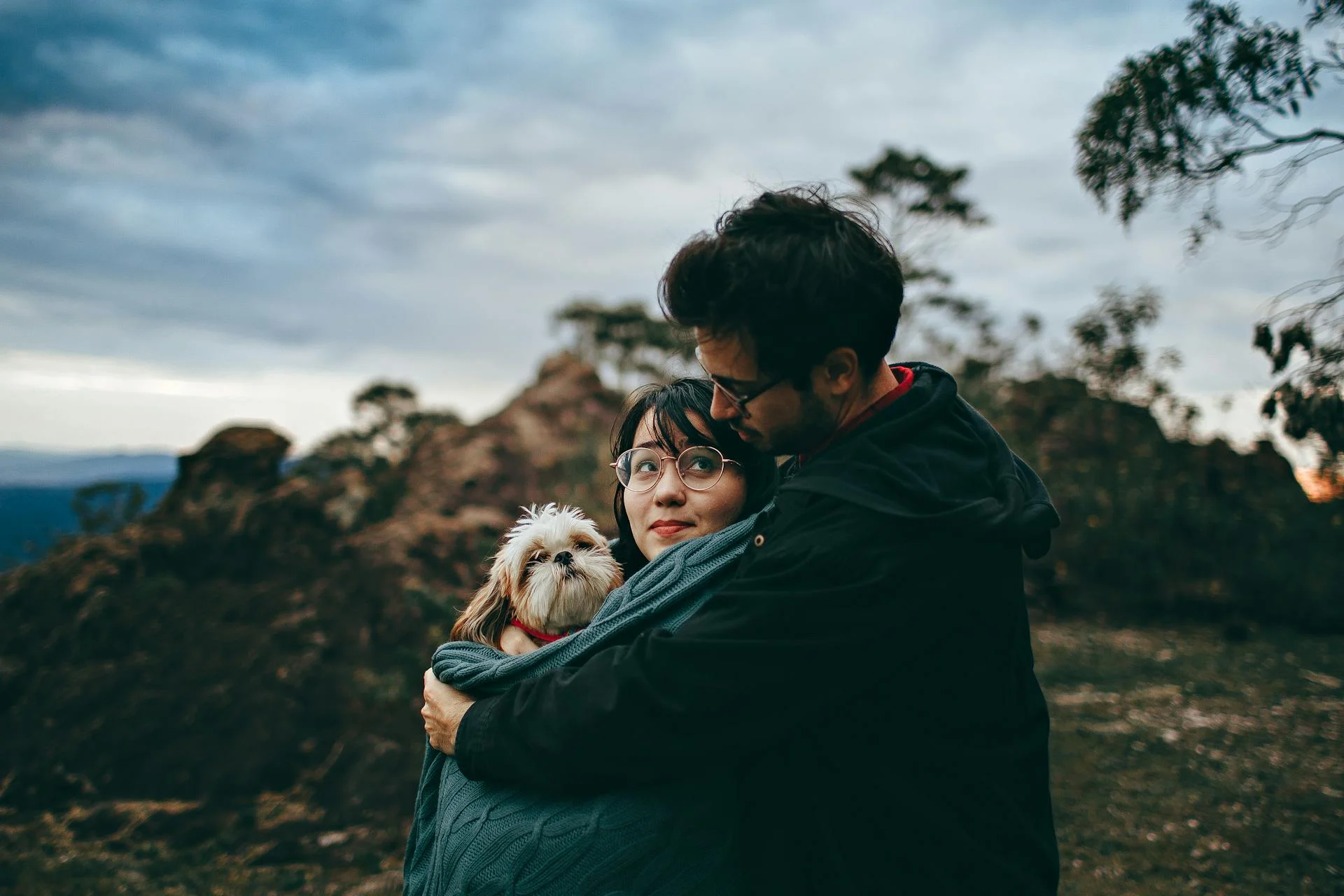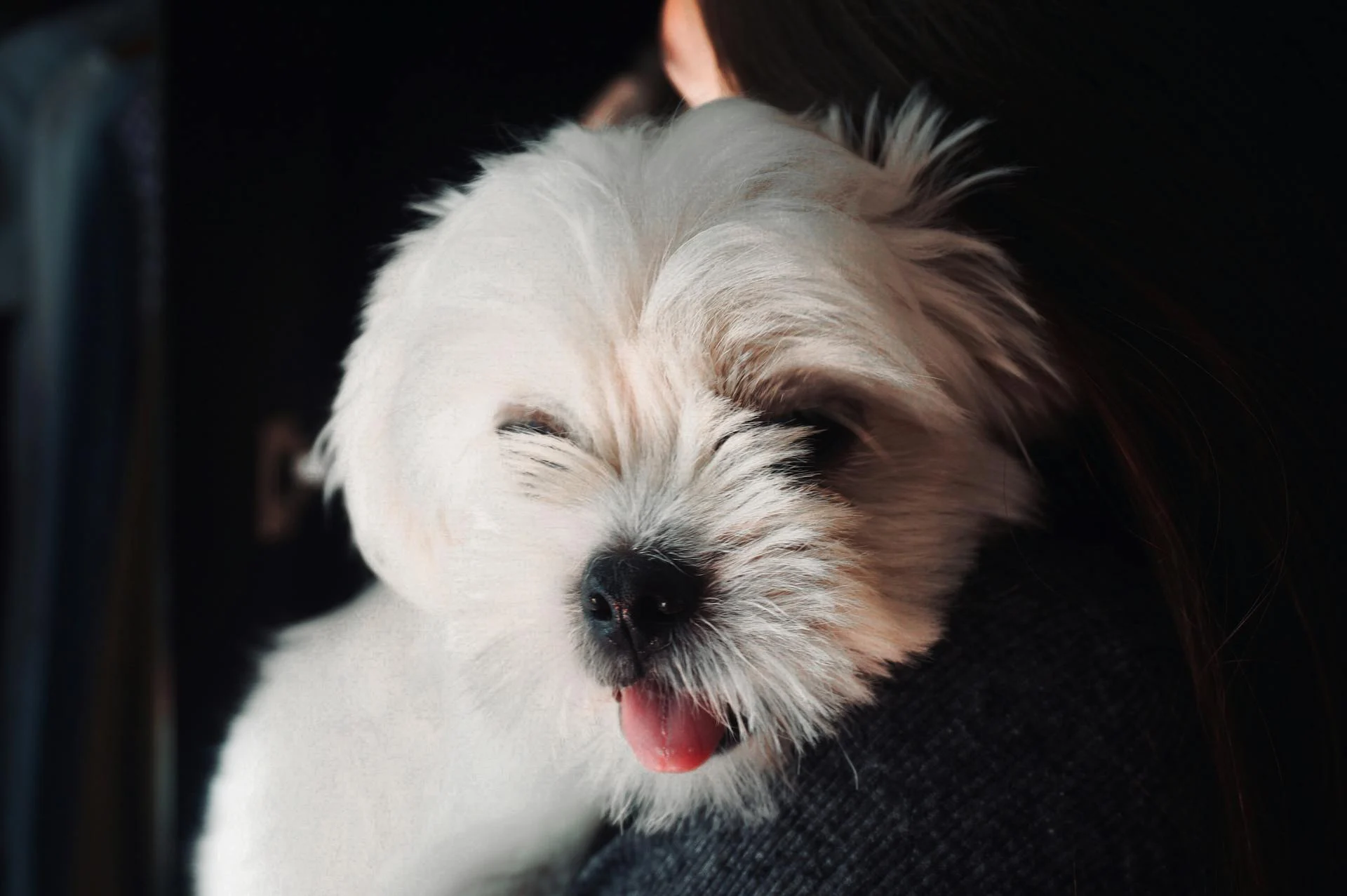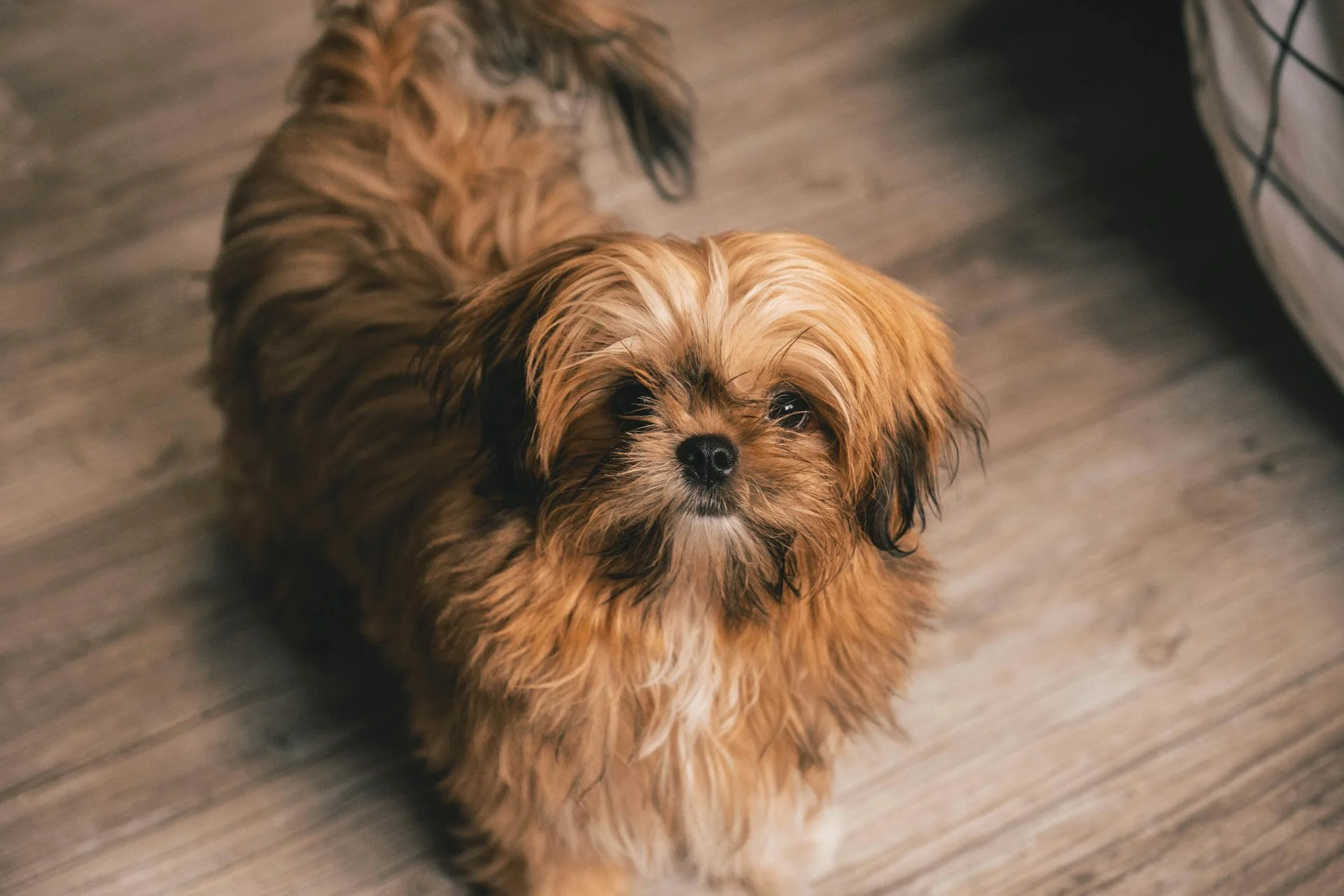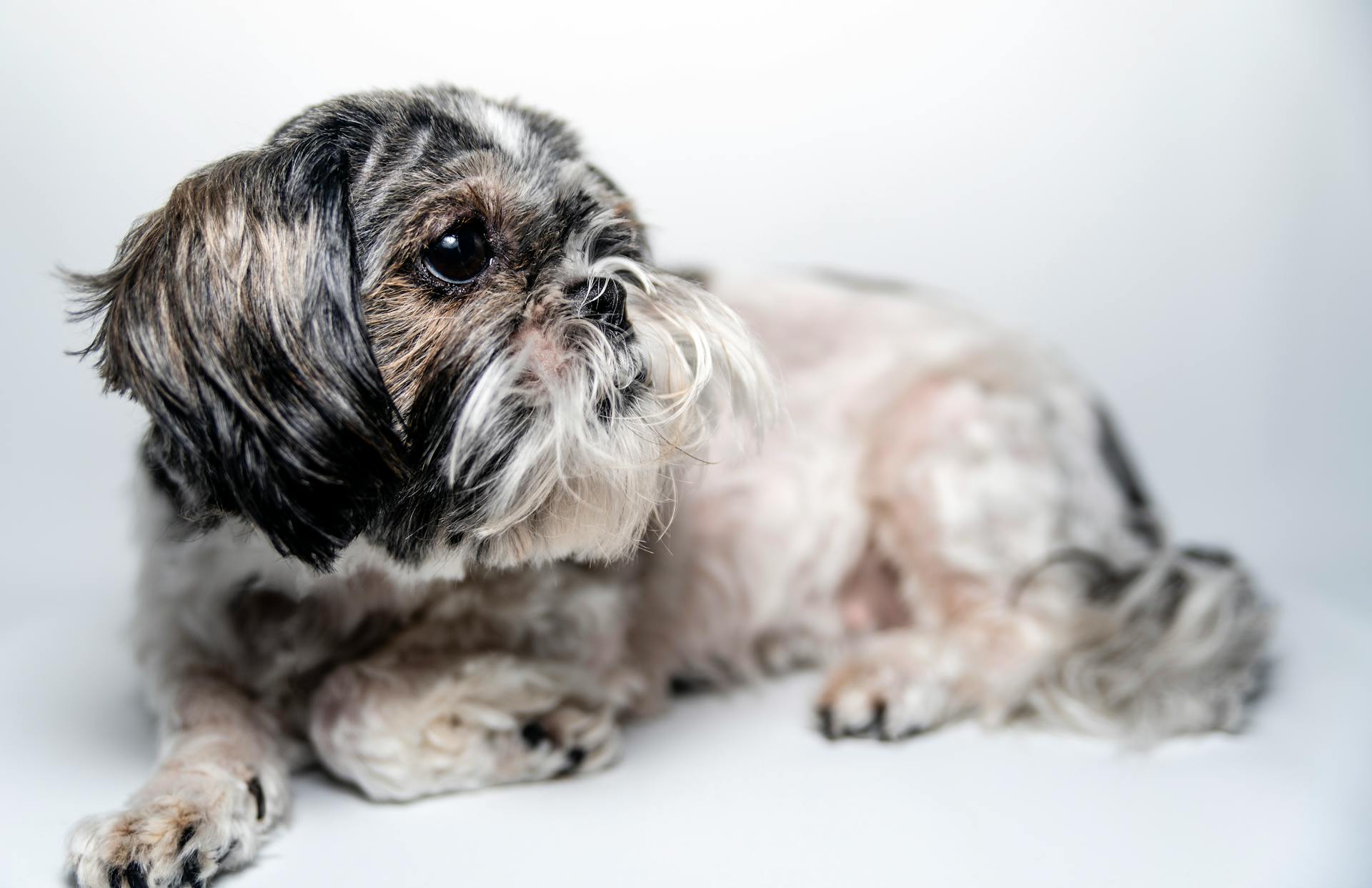
Shih Tzus are prone to wheezing and breathing difficulties due to their brachycephalic skull structure, which can cause their airways to become narrow and constricted.
This can lead to a range of respiratory problems, including wheezing, coughing, and difficulty breathing.
Their flat face and short nose can also cause their tongue to fall back and block their airway, making breathing even more challenging.
As a result, Shih Tzus may exhibit signs of respiratory distress, such as rapid breathing, panting, and wheezing, especially during exercise or in hot weather.
Their small size and compact body can also make them more susceptible to respiratory problems, as they have less room for their lungs to expand and contract.
In severe cases, wheezing and breathing difficulties in Shih Tzus can be life-threatening and require immediate veterinary attention.
Take a look at this: Shih Tzu Difficulty Breathing
Obstructive
Wheezing in Shih Tzus can be a concerning symptom, but understanding the possible causes can help you identify the root of the issue. Wheezing is defined as a continuous, pitchy, whistling sound heard over the lung field, typically during expiration.
One possible cause of wheezing in dogs is kennel cough, which can lead to a persistent cough and wheezing. Kennel cough is a common issue in dogs, especially in those with weakened immune systems.
Chronic bronchitis is another condition that can cause wheezing in dogs, including Shih Tzus. This condition is characterized by persistent coughing episodes lasting for more than two months, often triggered by factors such as allergies, irritants, and tracheal collapse.
Foreign bodies can also obstruct the airways and cause wheezing in dogs. If you suspect that your Shih Tzu has inhaled something, it's essential to seek veterinary attention immediately.
Laryngeal paralysis can also cause wheezing in dogs, as it affects the muscles controlling the voice box, leading to airway obstruction. This condition requires prompt veterinary care to prevent complications.
Breeds Prone to Wheezing
Dogs with brachycephalic syndrome, a condition that affects breathing, are more prone to wheezing. This includes breeds like the English bulldog, pug, French bulldog, and Boston terrier.
Wheezing is also common in dogs with heart disease, which can cause fluid accumulation in the lower chest and lead to labored breathing. In severe cases, pronounced wheezing may develop.
Some dog breeds are more susceptible to wheezing due to their physical characteristics. Here are some breeds that may be prone to wheezing:
What Boas?
BOAS is a serious condition that can affect dogs, causing them to wheeze and struggle to breathe. It's caused by a combination of anatomical variations that obstruct airflow.
Some of the possible respiratory tract variations that can contribute to BOAS include stenotic nares, which are congenitally small nostrils that may collapse as the dog inhales. An elongated soft palate can also cause obstruction of airflow into the larynx.
Dogs with BOAS may also have a hypoplastic trachea, which means their windpipe is proportionally too narrow. This can make it harder for them to breathe.
Other possible findings that can contribute to airflow obstruction include laryngeal collapse and enlarged or everted tonsils. These can cause even more swelling and inflammation in the throat, making breathing even more difficult.
Here are some of the possible anatomical variations that can lead to BOAS:
- Stenotic nares (congenitally small nostrils)
- Elonated soft palate (obstructing airflow into the larynx)
- Hypoplastic trachea (windpipe that is proportionally too narrow)
- Laryngeal collapse
- Enlarged or everted tonsils
Breeds Prone to Wheezing
Dogs with short snouts, or brachycephalic breeds, are more prone to wheezing due to their unique anatomy. Breeds like the Shih Tzu, Boxer, Pug, and others have longer soft palates that get irritated more easily.
Some brachycephalic breeds include the English bulldog, French bulldog, and Boston terrier, which can also experience wheezing due to their short snouts. These breeds often have a harder time breathing, which can lead to wheezing.
Small dogs, like Beagles and Yorkshire Terriers, are also more prone to wheezing due to their smaller throats. As dogs age, wheezing can become more common, but it's usually not a cause for concern.
Here are some breeds that are considered brachycephalic and may be more prone to wheezing:
- Affenpinscher
- Boston Terrier
- Boxer
- Bullmastiff
- Brussels Griffon
- Cane Corso
- Chow Chow
- Dogue de Bordeaux
- English Bulldog
- English Toy Spaniel
- French Bulldog
- Japanese Chin
- Lhasa Apso
- Pekingese
- Pug
- Shih Tzu
Symptoms and Effects
If your Shih Tzu is wheezing, it's essential to recognize the underlying symptoms and effects. Shih Tzus can experience troubled breathing, which is characterized by visible movement of the chest and stomach during breath, flared nostrils during breath, open-mouthed breathing, and noisy breathing.
Expand your knowledge: Shih Tzu Breathing Fast
Troubled breathing can lead to a range of issues, including exercise intolerance, where your Shih Tzu tires easily with exercise. They may also experience overheating, pale or blue gums, and collapse.
Common signs of wheezing in Shih Tzus include noisy breathing, snoring, gagging or retching, coughing, and trouble breathing or increased effort to breathe. These symptoms can range from mild to severe and are often related to upper airway blockage due to the breed's congenital anatomical conditions.
Here are some key symptoms to look out for:
- Noisy breathing
- Snoring
- Gagging or retching
- Coughing
- Trouble breathing or increased effort to breathe
- Increased panting
Symptoms
Dogs with breathing difficulties often exhibit visible signs, such as the visible movement of their chest and stomach during breath.
Their nostrils may flare during breath, and they may breathe with their mouth open, making it easy to notice.
Noisy breathing is a common symptom, and they may hold their head low and extended, with elbows bowed out.
If your dog is breathing more quickly than normal, it could be a sign of tachypnea.
Some dogs with this condition may breathe more quickly with their mouth closed, while others may breathe more quickly with their mouth open.
Shallow breaths and a tongue hanging out of their mouth are also possible signs.
Dogs with brachycephalic airway syndrome may exhibit a range of symptoms, including noisy breathing and snoring.
Other signs may include gagging or retching, coughing, and trouble breathing or increased effort to breathe.
Increased panting, exercise intolerance, and distended abdomen or vomiting from swallowing too much air while working to breathe are also possible.
Overheating and pale or blue gums can be serious signs of this condition.
In severe cases, dogs may even collapse.
Curious to learn more? Check out: Shih Tzu Mouth
Effects
Breathing difficulties are a common effect of Brachycephalic Airway Syndrome. This is due to the anatomical changes in their throats and airways caused by their short snouts.
Overheating is another effect of this condition, as the dogs' bodies struggle to regulate their temperature. This can be particularly concerning during hot weather or exercise.

Their breathing difficulties can lead to a range of other symptoms, including panting, wheezing, and coughing. These sounds can be distressing to hear, and it's essential to take them to the vet if you notice them.
The structural changes in their airways can also cause their tongues to fall back and obstruct their airways. This can be a life-threatening situation if not addressed promptly.
Symptoms of Difficulties
Breathing difficulties in dogs can manifest in different ways, and it's essential to recognize the symptoms to get your furry friend the help they need.
Visible movement of the chest and stomach during breathing, flared nostrils during breath, open-mouthed breathing, and noisy breathing are all signs of dyspnea, or troubled breathing.
If your dog is experiencing tachypnea, or rapid breathing, you might notice them breathing more quickly than normal, with a closed or open mouth.
Breathing difficulties can also cause your dog to hold their head low and extended, with elbows bowed out.
You might enjoy: Info on Shih Tzu Dogs

Noisy breathing, snoring, gagging or retching, and coughing are all symptoms of Brachycephalic Airway Syndrome.
A dog with breathing difficulties might also pant more than usual, tire easily with exercise, or even collapse.
Here are some common symptoms of breathing difficulties in dogs:
- Visible movement of chest and stomach during breath
- Flared nostrils during breath
- Open-mouthed breathing
- Noisy breathing
- Head held low and extended; elbows bowed out
- Breathing more quickly than normal, with a closed or open mouth
- Noisy breathing, snoring, gagging or retching, and coughing
- Trouble breathing or increased effort to breathe
- Increased panting
- Exercise intolerance (tire easily with exercise)
- Distended abdomen or vomiting from swallowing too much air while working to breathe
- Overheating
- Pale or blue gums
- Collapse
Reverse Sneezing
Reverse sneezing can be a concerning symptom for dog owners, but in many cases, it's nothing to worry about.
Brachycephalic dogs, or dogs with short snouts, are more prone to reverse sneezing due to their longer soft palates that get irritated easily.
Some breeds that fall under this category include Shih Tzus, Boxers, and Pugs.
Small dogs are also more likely to experience reverse sneezing, with breeds like Beagles and Yorkshire Terriers being more susceptible.
As dogs age, reverse sneezing episodes may become more frequent, but this is usually a natural occurrence and not a cause for concern.
However, if your dog has never reverse sneezed before and starts doing so more often, it's a good idea to consult with a vet just to be safe.
Here are some common causes of reverse sneezing:
- Getting overly excited
- Rapid eating and drinking
- Pollen, dust, or allergens
- Perfumes
- Post-nasal drip or nasal inflammation
- Household cleaners or chemicals
- Viruses or mites
- Exercise intolerance
- Pulling on a leash
- Foreign substances in the throat
Frequently Asked Questions
How do you soothe a wheezing dog?
Soothing a wheezing dog can be achieved through environmental management and medication, such as using humidifiers, antihistamines, or anti-inflammatories to alleviate symptoms
Why is my Shih Tzu huffing?
Your Shih Tzu may be huffing due to a narrowed airway, a common issue in breeds with short muzzles like yours. Possible causes include allergens like pollen or dust mites, and learning more about these triggers can help you provide relief
Sources
- https://www.vet.cornell.edu/departments-centers-and-institutes/riney-canine-health-center/canine-health-information/brachycephalic-obstructive-airway-syndrome-boas
- https://dogtime.com/dog-health/52371-dog-honking-reverse-sneezing
- https://wagwalking.com/condition/breathing-difficulties
- https://www.petmd.com/dog/conditions/respiratory/brachycephalic-airway-syndrome-dogs
- https://www.zumalka.com/blogs/blog-pet-health/is-your-dog-wheezing-here-are-5-home-remedies-to-go-for
Featured Images: pexels.com

